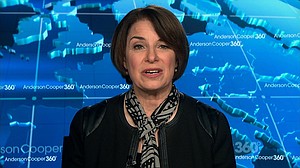2/18/2019

By David Perry
(CNN) -- The launch of Sen. Amy Klobuchar's presidential campaign at Boom Island Park on the Mississippi River, in the middle of a friendly little blizzard, was a perfect political event. Thousands of people showed up, some on skis or hauling their kids on sleds, to see Minnesota's senior senator enter the race. Dogs played in the snow. There were campfires burning in the shelters and plenty of hot cocoa to go around.
As I drank hot cider and listened to DJ Dudley D spin tunes, I found myself doing a little shuffle dance to stay warm. A drumline from north Minneapolis kicked the formal proceedings off, elite Minnesota politicians revved up the crowd, and the snow fell harder as the DJ played Dessa's "The Bullpen" for the senator's entrance music. Klobuchar gave her speech. The crowd cheered. We all sloshed our way back to our cars to get warm. That's the fun part. Now the hard work of the campaign begins.
Amy Klobuchar will inevitably be compared to the other female senators running for president. When it comes to policy and self-presentation (as opposed to the sexism that she will inevitably experience), that's a mistake. Klobuchar is not going to be competing on the progressive edge of the Democratic primary electorate, but is instead is projecting herself as a hard-working, blue-collar Midwesterner.
This is a frame that distinguishes her from the coastal candidates like Kamala Harris, Elizabeth Warren and Kirsten Gillibrand and reminds me, more than anything else, of the pitch that former Vice President Joe Biden might make if he decides to run. Like Biden has in the past and surely would do again, Klobuchar's reaching out to an important swath of the overall electorate in competitive states like Wisconsin and Pennsylvania, but also to a much smaller percentage of the Democratic primary electorate. So as she starts campaigning, there are plenty of questions about whether she can win and what her formal entry into the race might mean for other would-be moderate candidates or potential candidates.
Those questions, though, belong to the "horse race," and they aren't the most important questions we should be asking in these early days. One of my goals, following the work of NYU journalism professor Jay Rosen, is to weigh candidates not based on their poll numbers but on the extent to which they are addressing the key issues voiced by their potential voters -- one of whom is me. I am a Minnesota Democrat. I voted for Klobuchar enthusiastically last November, but none of the 2020 candidates have won me over yet.
At the announcement, despite the snow, I heard potential supporters consistently raise three issues: climate change, universal healthcare and income inequality. I know what the progressive vision to address these three issues looks like. The Green New Deal proposes transforming the economy while addressing decarbonization at the same time. Competing Medicare- and Medicaid-for-all proposals would move toward more universal healthcare (with important caveats around immigrants and long-term support for disabled Americans). Wealth taxes (such as the one proposed by Elizabeth Warren) and increases on top marginal tax rates would go a long way towards shifting wealth back to the people who actually do the hard work in this country. Few in the Minnesota crowd talked about the abuses of the Department of Homeland Security, but again, there's a progressive vision of a more just America: Abolish ICE (Immigration and Customs Enforcement).
I'm less sure what the centrist vision is. Klobuchar has called the Green New Deal and Medicare-for-all discussion starters. Well, the time to have that discussion is right now. Anyone who wants to be president needs a plan to get us from where we are today to a better place. If not Medicare-for-all, then what's the plan to cover everyone?
If not the Green New Deal, what is the senator's plan to hold climate change to a 2-degree rise? The details matter. Klobuchar, but really everyone who wants to be president, needs to give more than glib, polished answers -- they need to actually show their work.
